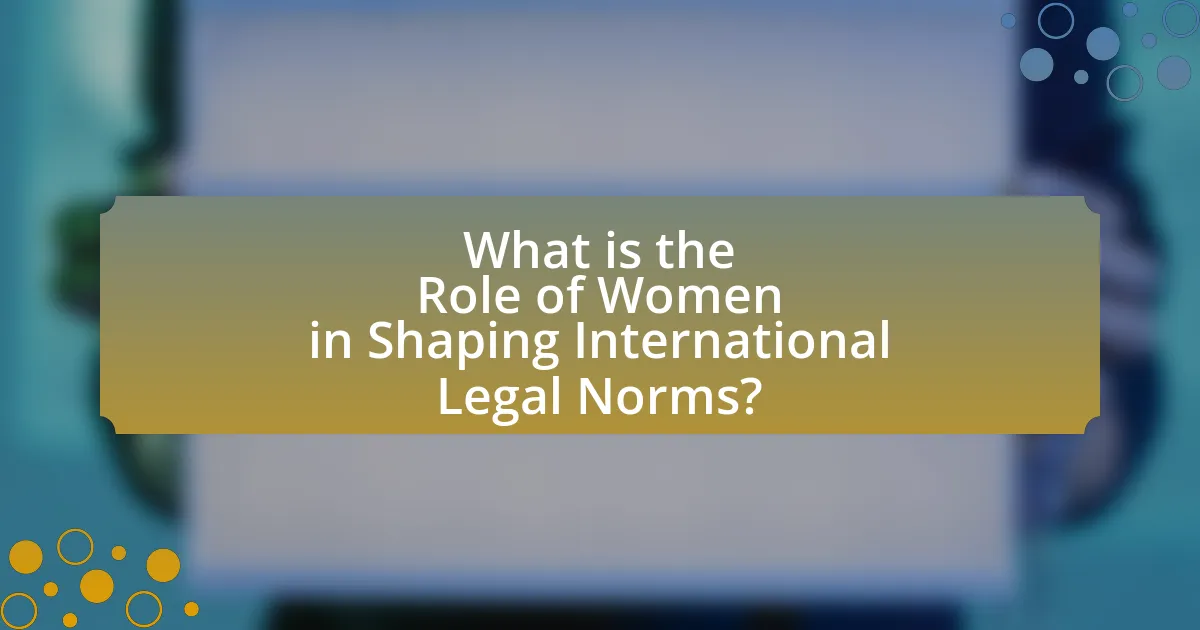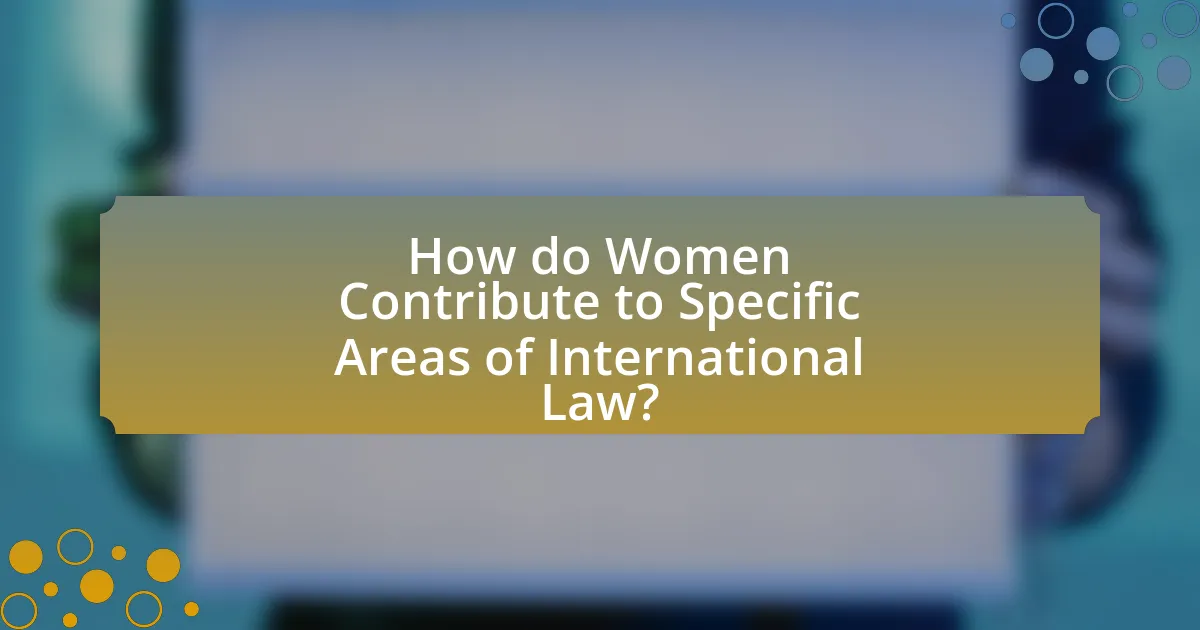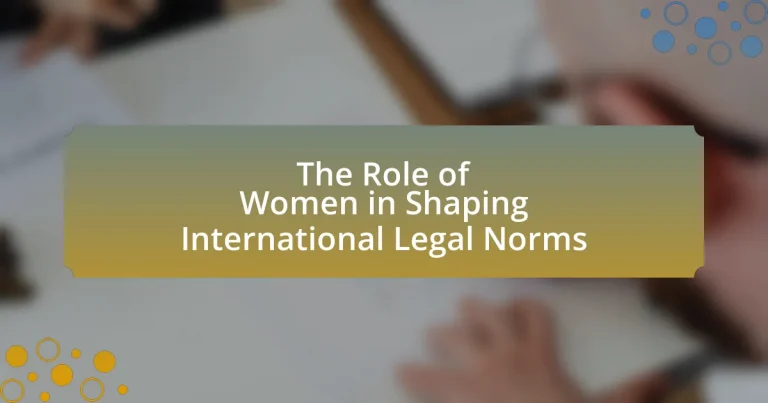The article examines the pivotal role of women in shaping international legal norms, highlighting their contributions to gender equality and human rights through advocacy and participation in legal frameworks. It outlines historical influences, key milestones, and the impact of women’s movements on global legal reforms, emphasizing the necessity of including women’s perspectives in international legal discussions. The article also addresses the challenges women face in the legal profession, their involvement in specific areas such as human rights and environmental law, and emerging trends that indicate increased female participation in shaping legal norms. Additionally, it discusses strategies to enhance women’s influence and practical steps individuals can take to support gender equality in international law.

What is the Role of Women in Shaping International Legal Norms?
Women play a crucial role in shaping international legal norms by advocating for gender equality and human rights through various platforms, including international organizations and legal frameworks. Their contributions have led to significant advancements, such as the inclusion of gender perspectives in treaties like the Convention on the Elimination of All Forms of Discrimination Against Women (CEDAW), adopted by the United Nations in 1979, which has influenced national laws and policies worldwide. Additionally, women have been instrumental in the establishment of international criminal law, particularly in addressing gender-based violence, as seen in the Rome Statute of the International Criminal Court, which recognizes sexual violence as a war crime. These efforts demonstrate that women’s involvement is essential for the development and implementation of comprehensive legal standards that promote justice and equality on a global scale.
How have women historically influenced international legal frameworks?
Women have historically influenced international legal frameworks through advocacy, participation in peace negotiations, and the establishment of legal norms addressing gender equality and human rights. For instance, the inclusion of women’s rights in the 1948 Universal Declaration of Human Rights was significantly driven by female activists like Eleanor Roosevelt, who played a pivotal role in its drafting. Additionally, the Convention on the Elimination of All Forms of Discrimination Against Women (CEDAW), adopted in 1979, was a direct result of women’s movements advocating for legal recognition of gender equality. These contributions demonstrate that women’s activism has been crucial in shaping international legal standards and frameworks that promote gender justice and human rights.
What key milestones mark women’s contributions to international law?
Key milestones marking women’s contributions to international law include the establishment of the Women’s International League for Peace and Freedom in 1915, which advocated for women’s rights in peace negotiations, and the inclusion of women in the drafting of the United Nations Charter in 1945, which emphasized gender equality. Additionally, the adoption of the Convention on the Elimination of All Forms of Discrimination Against Women (CEDAW) in 1979 represented a significant legal framework for women’s rights globally. These milestones demonstrate the evolving role of women in shaping international legal norms and advancing gender equality in legal contexts.
How have women’s movements impacted legal reforms globally?
Women’s movements have significantly influenced legal reforms globally by advocating for gender equality and women’s rights, leading to the enactment of laws that protect these rights. For instance, the suffragette movement in the early 20th century resulted in women gaining the right to vote in numerous countries, fundamentally altering political landscapes. Additionally, the United Nations’ adoption of the Convention on the Elimination of All Forms of Discrimination Against Women (CEDAW) in 1979 was largely driven by women’s advocacy groups, establishing a framework for legal reforms aimed at eliminating discrimination and promoting gender equality in member states. These movements have also spurred reforms in areas such as reproductive rights, domestic violence laws, and workplace equality, demonstrating their profound impact on shaping legal norms and policies worldwide.
Why is the inclusion of women essential in international legal discussions?
The inclusion of women is essential in international legal discussions because it ensures diverse perspectives that lead to more comprehensive and equitable legal frameworks. Research indicates that women’s participation in peace negotiations increases the likelihood of reaching agreements that are sustainable and inclusive; for instance, a study by the United Nations found that peace agreements are 35% more likely to last at least 15 years when women are involved in the negotiation process. Furthermore, women’s experiences and insights contribute to addressing issues such as gender-based violence and discrimination, which are critical in shaping effective international legal norms.
What unique perspectives do women bring to international law?
Women bring diverse perspectives to international law, emphasizing inclusivity, human rights, and social justice. Their experiences often highlight the impact of legal frameworks on marginalized communities, leading to a more comprehensive understanding of justice. For instance, women’s advocacy has been pivotal in shaping international treaties like the Convention on the Elimination of All Forms of Discrimination Against Women (CEDAW), which addresses gender-based discrimination and promotes equality. Additionally, women’s participation in peace negotiations has been shown to result in more sustainable agreements, as evidenced by research from the United Nations, which indicates that peace processes involving women are 35% more likely to last at least 15 years. This underscores the critical role women play in enhancing the effectiveness and fairness of international legal norms.
How does gender diversity enhance the effectiveness of legal norms?
Gender diversity enhances the effectiveness of legal norms by incorporating a broader range of perspectives and experiences, which leads to more comprehensive and equitable legal frameworks. Research indicates that diverse groups are more innovative and effective in problem-solving, as they can address issues from multiple viewpoints. For instance, a study published in the Harvard Business Review found that teams with higher gender diversity outperform their less diverse counterparts in decision-making processes. This diversity ensures that legal norms are more reflective of the needs and rights of all individuals, thereby increasing their legitimacy and acceptance within society.
What challenges do women face in influencing international legal norms?
Women face significant challenges in influencing international legal norms, primarily due to systemic gender biases and underrepresentation in decision-making bodies. These biases manifest in various forms, including limited access to leadership roles, which is evident as women hold only about 25% of parliamentary seats globally, according to the Inter-Parliamentary Union. Additionally, cultural and societal norms often prioritize male perspectives, hindering women’s contributions to legal discourse. Furthermore, the lack of financial resources and support networks restricts women’s ability to engage in advocacy and policy-making effectively. These factors collectively impede women’s capacity to shape and influence international legal frameworks.
What barriers exist for women in legal professions globally?
Barriers for women in legal professions globally include gender bias, lack of mentorship, work-life balance challenges, and limited access to leadership roles. Gender bias manifests in hiring practices and workplace culture, often leading to women being overlooked for promotions and high-profile cases. A study by the International Bar Association found that women make up only 30% of partners in law firms worldwide, highlighting the disparity in advancement opportunities. Additionally, the absence of mentorship programs limits women’s professional development, while societal expectations regarding family responsibilities create obstacles in achieving work-life balance. These factors collectively hinder women’s progress in the legal field.
How do cultural and societal norms affect women’s roles in law?
Cultural and societal norms significantly influence women’s roles in law by shaping perceptions of gender equality and professional opportunities. In many societies, traditional views often limit women’s participation in legal professions, leading to underrepresentation in law schools and legal practice. For instance, a study by the World Bank in 2020 highlighted that in regions with strong patriarchal norms, women constitute only 30% of the legal workforce, compared to over 50% in more egalitarian societies. These norms can also affect the types of legal issues women are encouraged to pursue, often steering them towards family law rather than corporate or criminal law, thereby reinforcing gender stereotypes.

How do Women Contribute to Specific Areas of International Law?
Women contribute to specific areas of international law by actively participating in the development and implementation of legal frameworks that address issues such as human rights, humanitarian law, and environmental law. For instance, women have played pivotal roles in shaping international human rights treaties, including the Convention on the Elimination of All Forms of Discrimination Against Women (CEDAW), which was adopted by the United Nations in 1979 and has been instrumental in promoting gender equality globally. Additionally, women have been influential in the establishment of the International Criminal Court (ICC), where female legal experts have contributed to prosecuting gender-based crimes, thereby enhancing the legal recognition of women’s rights in conflict situations. Their involvement in international negotiations and advocacy has led to the incorporation of gender perspectives in various legal instruments, demonstrating their essential role in advancing international legal norms.
What roles do women play in human rights law?
Women play critical roles in human rights law as advocates, policymakers, and legal practitioners. They contribute to the development and enforcement of international legal norms that promote gender equality and protect women’s rights. For instance, women have been instrumental in the drafting of key documents such as the Convention on the Elimination of All Forms of Discrimination Against Women (CEDAW), which was adopted by the United Nations in 1979 and has been ratified by 189 countries. Additionally, women serve as judges and legal experts in international courts, influencing landmark decisions that shape human rights jurisprudence. Their participation ensures that women’s perspectives and experiences are integrated into legal frameworks, thereby enhancing the effectiveness of human rights protections globally.
How have women advocated for gender equality in human rights treaties?
Women have advocated for gender equality in human rights treaties through grassroots activism, participation in international forums, and the establishment of legal frameworks that address gender discrimination. For instance, the Convention on the Elimination of All Forms of Discrimination Against Women (CEDAW), adopted in 1979, was significantly influenced by women’s rights activists who lobbied for its creation and implementation. Additionally, women have played crucial roles in drafting and negotiating various human rights treaties, ensuring that gender perspectives are integrated into international law. Their efforts have led to the recognition of gender-based violence as a violation of human rights, as seen in the 1993 Declaration on the Elimination of Violence Against Women. These actions demonstrate the impact of women’s advocacy in shaping legal norms that promote gender equality globally.
What impact have female leaders had on human rights organizations?
Female leaders have significantly advanced human rights organizations by promoting inclusive policies and advocating for marginalized groups. Their leadership has often resulted in increased visibility for issues such as gender equality, racial justice, and LGBTQ+ rights. For instance, figures like Michelle Bachelet, former UN High Commissioner for Human Rights, have emphasized the importance of integrating women’s rights into broader human rights agendas, leading to the adoption of resolutions that prioritize gender-based violence and discrimination. Additionally, research indicates that organizations led by women tend to have more diverse boards and staff, which enhances their effectiveness in addressing complex human rights challenges. This impact is evidenced by the increased funding and support for initiatives focused on women’s rights and social justice under female leadership.
How are women involved in international humanitarian law?
Women are involved in international humanitarian law through advocacy, participation in legal frameworks, and contributions to policy-making. Their involvement has been recognized in various international agreements, such as the United Nations Security Council Resolution 1325, which emphasizes the importance of women’s participation in peace and security processes. Additionally, women have played crucial roles in organizations like the International Committee of the Red Cross, where they contribute to the development and implementation of humanitarian law. Studies indicate that women’s perspectives enhance the effectiveness of humanitarian responses, as evidenced by research from the Geneva Academy of International Humanitarian Law and Human Rights, which highlights the positive impact of gender-inclusive approaches on legal norms and practices.
What contributions have women made to the Geneva Conventions?
Women have significantly contributed to the Geneva Conventions through advocacy, legal scholarship, and participation in humanitarian efforts. Notably, figures such as Marie-Louise Giraud and other women activists played crucial roles in promoting the inclusion of protections for civilians and the wounded during armed conflicts. Their efforts led to the establishment of provisions that address the specific needs of women and children in wartime, emphasizing the importance of gender considerations in humanitarian law. Additionally, women have been instrumental in shaping the discourse around international humanitarian law, influencing the development of legal norms that prioritize human rights and dignity in conflict situations.
How do women address issues of war crimes and gender-based violence?
Women address issues of war crimes and gender-based violence through advocacy, legal reform, and participation in international tribunals. They actively engage in grassroots movements, raise awareness, and push for accountability by documenting violations and supporting survivors. For instance, organizations like Women’s Initiatives for Gender Justice have been instrumental in influencing the International Criminal Court’s policies on gender-based violence, highlighting the need for gender-sensitive approaches in legal frameworks. Additionally, women have played critical roles in peace negotiations and post-conflict reconstruction, ensuring that gender perspectives are integrated into peacebuilding efforts, as evidenced by the United Nations Security Council Resolution 1325, which emphasizes women’s involvement in peace and security processes.
What influence do women have in environmental law?
Women significantly influence environmental law through advocacy, policymaking, and leadership roles. Their participation has led to the incorporation of gender perspectives in environmental policies, which is essential for addressing issues like climate change and biodiversity loss. For instance, the United Nations Framework Convention on Climate Change recognizes the importance of gender in climate action, highlighting women’s roles in sustainable development. Research indicates that countries with higher female representation in environmental governance tend to adopt more comprehensive environmental policies, demonstrating that women’s involvement leads to more effective legal frameworks.
How have women led initiatives for climate justice?
Women have led initiatives for climate justice by organizing grassroots movements, advocating for policy changes, and participating in international negotiations. For instance, women have played pivotal roles in movements like the Women’s Earth and Climate Action Network, which emphasizes the need for gender equity in climate policies. Additionally, women leaders, such as Wangari Maathai, have highlighted the intersection of environmental sustainability and women’s rights, demonstrating that empowering women is essential for effective climate action. Research shows that when women are involved in decision-making processes, climate resilience improves, as evidenced by studies from the United Nations Framework Convention on Climate Change, which indicate that gender-inclusive policies lead to better environmental outcomes.
What role do women play in international environmental treaties?
Women play a crucial role in international environmental treaties by advocating for gender-responsive policies and ensuring that women’s perspectives and needs are integrated into environmental governance. Their participation has been recognized in various treaties, such as the Convention on Biological Diversity, which emphasizes the importance of gender equality in achieving sustainable development. Research indicates that women’s involvement leads to more effective environmental management, as they often possess unique knowledge and experiences related to natural resource use. For instance, studies show that when women are included in decision-making processes, there is a higher likelihood of successful implementation of environmental agreements, as evidenced by the outcomes of the Paris Agreement, where women’s leadership was highlighted as essential for climate action.

What Future Trends Can We Expect Regarding Women and International Legal Norms?
Future trends indicate that women will increasingly influence international legal norms through enhanced representation and advocacy. The growing participation of women in international organizations, such as the United Nations, has led to the incorporation of gender perspectives in legal frameworks, as evidenced by the adoption of the Women, Peace, and Security agenda in 2000, which emphasizes women’s roles in conflict resolution and peacebuilding. Furthermore, the rise of global movements like #MeToo and Time’s Up has catalyzed legal reforms addressing gender-based violence and discrimination, pushing for stronger international standards. These trends suggest a trajectory toward more inclusive legal norms that prioritize gender equality and women’s rights on a global scale.
How is the role of women in international law evolving?
The role of women in international law is evolving through increased representation and influence in legal frameworks and decision-making processes. Women are increasingly participating in international legal institutions, such as the International Criminal Court and the United Nations, where they advocate for gender-sensitive policies and reforms. For instance, the adoption of United Nations Security Council Resolution 1325 in 2000 marked a significant milestone, emphasizing the importance of women’s participation in peace and security efforts. Furthermore, studies show that women’s involvement in peace negotiations leads to more sustainable agreements, highlighting their critical role in shaping international legal norms.
What emerging trends indicate increased female participation in legal frameworks?
Emerging trends indicating increased female participation in legal frameworks include the rise of women in leadership positions within legal institutions and the implementation of gender quotas in legislative bodies. For instance, as of 2021, women held approximately 25% of parliamentary seats globally, a significant increase from previous decades, reflecting a shift towards gender inclusivity in governance. Additionally, initiatives such as the United Nations’ Women, Peace, and Security agenda have emphasized the importance of women’s involvement in peace processes and legal reforms, further promoting their roles in shaping international legal norms. These trends demonstrate a growing recognition of the need for diverse perspectives in legal frameworks, contributing to more equitable and representative governance.
How are new technologies impacting women’s roles in international law?
New technologies are enhancing women’s roles in international law by providing platforms for advocacy, increasing access to legal resources, and facilitating networking opportunities. For instance, digital tools enable women lawyers and activists to share information and mobilize support for legal reforms more effectively. The rise of online legal databases and resources has improved women’s access to international legal frameworks, allowing them to engage more actively in shaping legal norms. Additionally, social media campaigns have amplified women’s voices in international law discussions, leading to greater visibility and influence in policy-making processes. These technological advancements have been crucial in promoting gender equality and empowering women within the legal field.
What strategies can enhance women’s influence in shaping legal norms?
Strategies that can enhance women’s influence in shaping legal norms include increasing women’s representation in decision-making bodies, promoting gender-sensitive legal frameworks, and fostering alliances among women’s organizations. Increasing representation ensures that women’s perspectives are included in the legislative process, as evidenced by the fact that countries with higher percentages of women in parliament tend to adopt more gender-equitable laws. Promoting gender-sensitive legal frameworks involves revising existing laws to address gender biases, which has been shown to improve women’s rights and access to justice in various jurisdictions. Additionally, fostering alliances among women’s organizations can amplify their collective voice, as seen in successful campaigns for legal reforms in areas such as domestic violence and reproductive rights.
How can mentorship programs support women in international law?
Mentorship programs can support women in international law by providing guidance, networking opportunities, and skill development tailored to the unique challenges they face in the field. These programs connect emerging female legal professionals with experienced mentors who can offer insights into navigating complex legal environments, thereby enhancing their confidence and competence. Research indicates that women in law benefit significantly from mentorship, as it can lead to increased career advancement and higher retention rates in the profession. For instance, a study by the American Bar Association found that women with mentors are more likely to achieve leadership positions compared to those without mentorship.
What best practices can organizations adopt to promote gender equality in legal fields?
Organizations can promote gender equality in legal fields by implementing mentorship programs, establishing transparent recruitment processes, and ensuring equitable pay practices. Mentorship programs connect women with experienced professionals, fostering career development and retention. Transparent recruitment processes help eliminate biases, as evidenced by studies showing that diverse hiring panels increase the likelihood of hiring women. Additionally, equitable pay practices are essential; research indicates that organizations with pay equity policies see improved employee satisfaction and retention rates. These best practices collectively contribute to a more inclusive legal environment, enhancing the role of women in shaping international legal norms.
What practical steps can individuals take to support women in international law?
Individuals can support women in international law by actively mentoring and sponsoring female law students and young professionals. This can be achieved through establishing mentorship programs that connect experienced practitioners with emerging female talent, thereby enhancing their career development and networking opportunities. Research indicates that mentorship significantly increases the likelihood of women advancing in their careers, as evidenced by a study from the American Bar Association, which found that women with mentors are more likely to achieve leadership positions. Additionally, individuals can advocate for gender diversity in legal institutions by promoting policies that ensure equal representation and participation of women in decision-making roles. Supporting organizations that focus on women’s rights and legal empowerment, such as the Women’s International League for Peace and Freedom, also contributes to creating a more equitable legal landscape.


